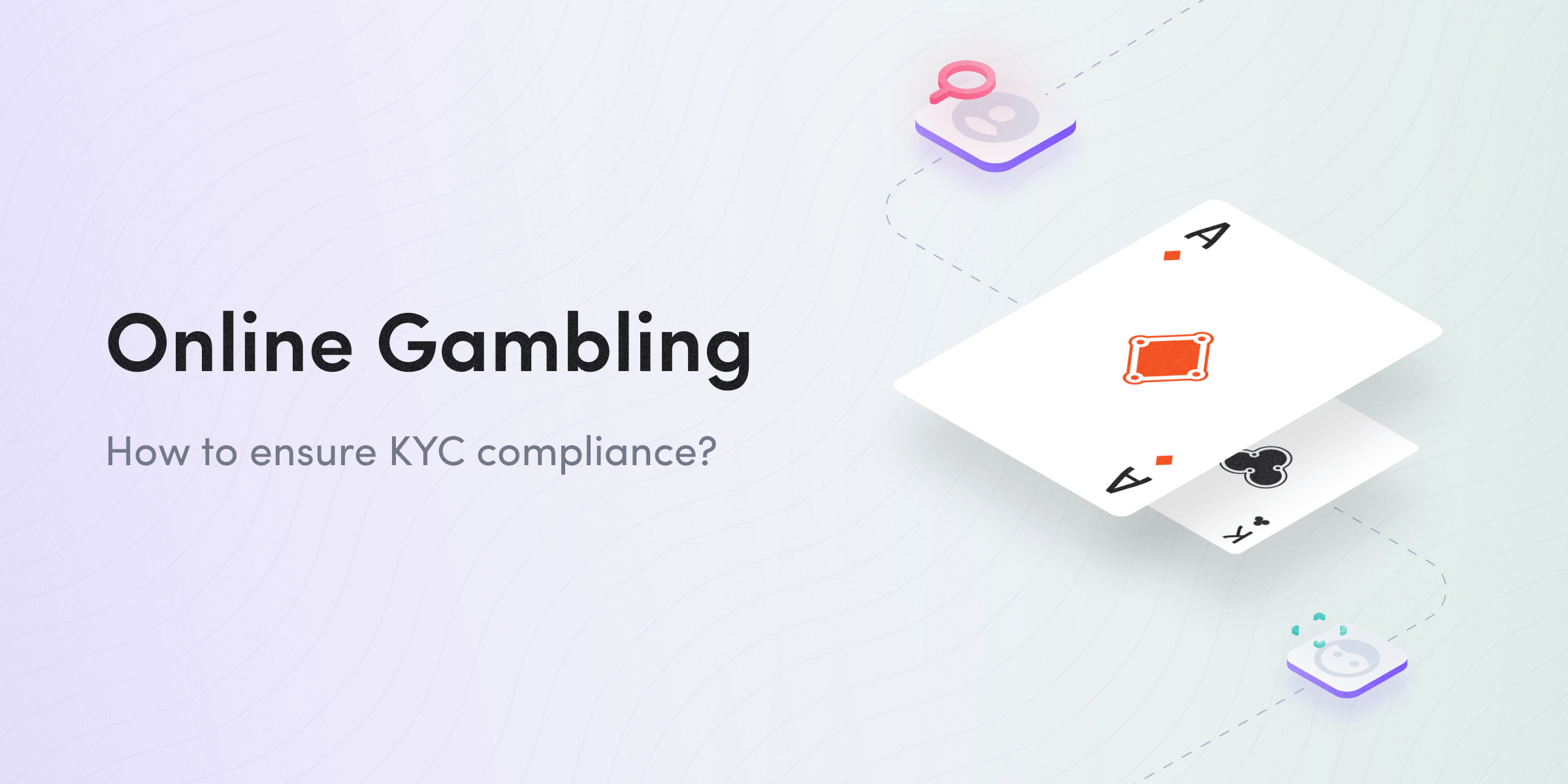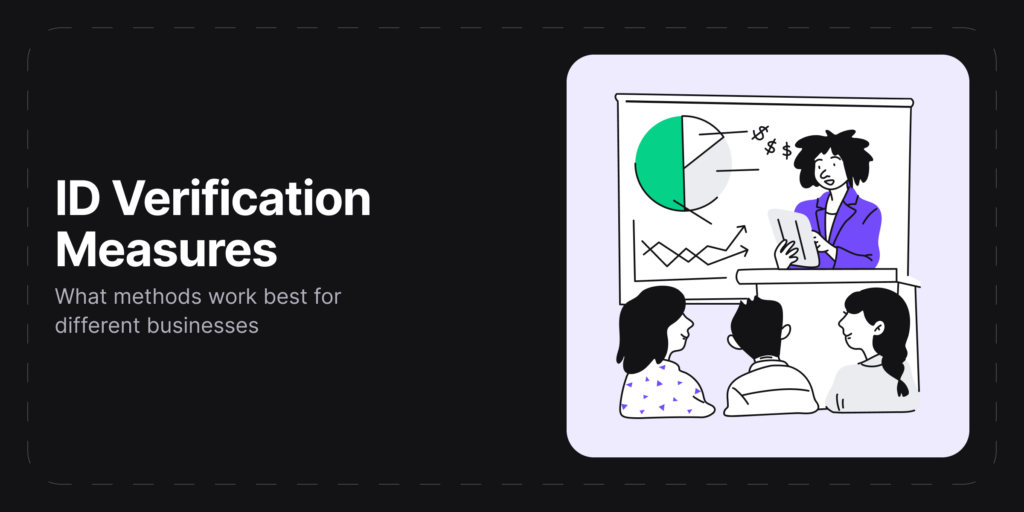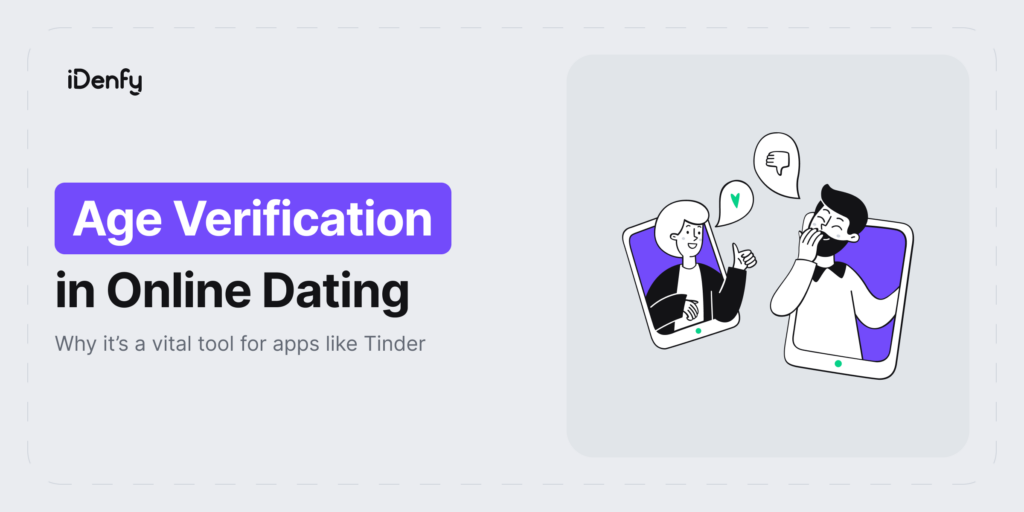Thinking of rolling the dice on regulations? That might not be the best idea. Some don’t want to admit it, but the gambling industry continues to hold the throne for being one of the most lively entertainment sectors out there. And it’s not a surprise. Around 26% of the world’s population gamble.
Even though some countries have banned online gambling, many casinos have found even bigger success online, turning traditional businesses into apps. Regular gamblers are now used to the digital scene, and as the market grows, more risks arise, including the classics, such as cyberattacks or money laundering.
Key takeaways:
- Many jurisdictions impose restrictions on online gambling institutions because of the industry’s adverse history of money laundering.
- The regulatory landscape is quickly changing. Each jurisdiction can take a different approach to online gambling.
As a gambling platform specializing in sports betting, live dealers, or online casino games, you should familiarize yourself with the basics of identity verification, fraud prevention, and compliance in online gambling.
What is KYC in Casinos, and why Gambling Platforms Need it
Know Your Customer (KYC) is a procedure that casinos and other online gambling platforms use for key compliance-related processes:
- Verify the age and identities of customers.
- Check the authenticity of identity documents.
- Detect potential risk factors, such as financial affordability issues and gambling addiction cases.
Casinos and gaming platforms need KYC to prevent minors from accessing age-restricted services and ensure compliance with regulatory rules. By implementing identity verification and monitoring customers’ gambling activity, for example, their spending patterns, casinos can see those who may be at risk of developing gambling problems, such as gambling addiction.
In cases where online gambling platforms and casinos fall short in either their KYC or Anti-Money Laundering (AML) requirements, federal agencies can intervene. They respond by asking for corrective actions, but they can also impose financial penalties or ban the casino from conducting their operations.
Explanation of the KYC Process in Online Casinos
The KYC process in online casinos is made out of several identity checks that players must undergo before participating in iGaming activities. This involves submitting government-issued ID documents such as ID cards, driver’s licenses, or passports, along with proof of address like utility bills, bank statements, and paychecks. Often, the casino’s internal compliance team reviews these documents to cross-reference the identity data, checking if everything is correct, including the player’s age or residency address.
However, gamblers sometimes complain about KYC procedures, especially since they can be both time-consuming and intrusive. That’s why it’s essential for online casino platforms to find a middle ground between meeting regulatory requirements and addressing player concerns. Thankfully, many RegTech providers now offer automated KYC solutions that are based on biometrics, focusing on both security and end-user experience.
Related: How to Improve KYC Verification? Tips For a Frictionless User Experience
Where is Online Gambling Legal?
Before trying your luck on any online gambling site, check the Terms & Conditions part to ensure that you don’t break any laws. While gambling businesses aren’t fast enough to count new users, it’s essential to break down the most important part of this form of entertainment: online gambling isn’t legal in every country.
USA
Gambling apps and online casinos are held as financial institutions based on the Bank Secrecy Act (BSA). The BSA assists US government agencies and aims to prevent money laundering. As of December 2022, six states have legalized online gambling and casino games: Michigan, Connecticut, Delaware, New Jersey, Pennsylvania, and West Virginia.
For instance, Delaware allows poker and casinos but forbids sports betting. In the meantime, New Jersey enables all of the mentioned gambling options. You can check the full list of states where online gambling is legal here.
Fun fact: It costs $10 million to obtain a gambling license in Pennsylvania.
Canada
iGaming, an online gaming market, began operating in Canada back in April 2022. The Alcohol and Gaming Commission presented licenses that enabled online gaming providers to share their services with the public. Many online gambling brands operate in Canada, but only a few casinos are legal outside of Ontario.
Fun fact: Many well-known Canadian casinos, such as Spin Casino or Jackpot City, are in the legally grey zone.
Europe
Similar to other regulatory frameworks, different countries in Europe have autonomy when it comes to iGaming. According to the European Commission, “there is no sector-specific EU legislation in the field of gambling services.” Despite that, gambling is permitted in most of Europe, including Poland, Hungary, Spain, Italy, the UK, and more.
Fun fact: Statista reports that the estimated revenue of the gambling market in Europe was 81.1 billion euros in 2020. Specialists expect a rise in the following years, with 2025 reaching the value of 111 billion euros.
Online Gambling: Pros and Cons
🟢 Pro: Here comes the best part about online gambling. All you need is a mobile device, and you can do it whenever, wherever. Online gambling brings convenience to today’s typical users. Not to mention, games are accessible 24/7, without the need to wait in line.
🟢 Pro: Legalized online gambling has a positive economic impact on most jurisdictions, which can be more entertainment options for consumers and increased employment, along with higher average salaries. For example, the American Gaming Association predicts that sports betting will contribute $22.4 billion to the country’s gross domestic product.
🔴 Con: Online gambling can be dangerous, especially for those who get hooked on free game versions where players use fake money. The idea is to spin the game to the player’s favor so they can get used to winning and have the same assumption when playing with real money.
🔴 Con: Unfortunately, underage gambling is still an issue. While most countries prohibit such entertainment for individuals under 18, it’s not the only reason why it’s important to protect minors. Online gambling activities can result in a severe addiction later in life.
Online Gambling Verification Requirements
Online gambling businesses must comply with anti-fraud laws, such as Know Your Customer (KYC) and Anti-Money Laundering (AML). That means apps and gambling sites must follow strict measures. Otherwise, they’re risking huge fines for non-compliance.
There are three main reasons why online gambling companies ask for ID:
- To confirm the client’s identity
- To check the gambler’s age
- To look into self-excluded individuals
To meet safety requirements, online gambling companies must ask their clients to prove their identity and age before they start gambling. If the customer were asked to complete identity verification earlier, they typically wouldn’t need to re-verify themselves. Despite that, there are some exceptions for additional AML checks.
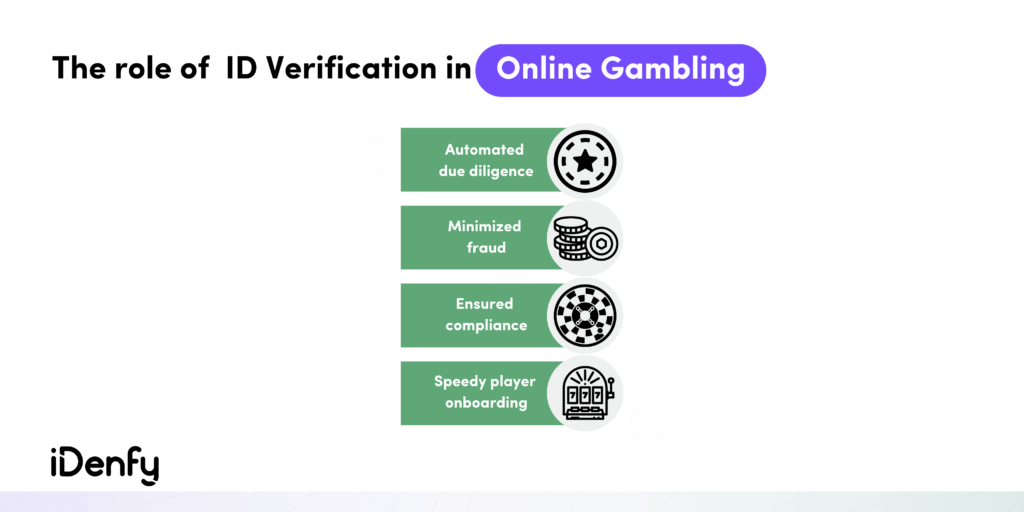
What Does KYC Mean in Gambling?
Due to customer due diligence (CDD), online gambling institutions must gather and assess customers’ or potential customers’ data. The rules are here for a reason. Taking steps to ensure CDD helps online gambling institutions prevent criminals from using their apps as a channel for money laundering activities.
There are three focal CDD rule points that online gambling businesses need to follow:
- To verify the customers’ identities
- To explore customers’ relationships and develop risk profiles
- To screen and monitor suspicious behavioral patterns and customers’ transactions
For example, what happens when an online casino fails to ensure compliance? In this case, the company receives requests to take action immediately. Without positive results, federal agencies can fine or ban online casinos from operating at all.
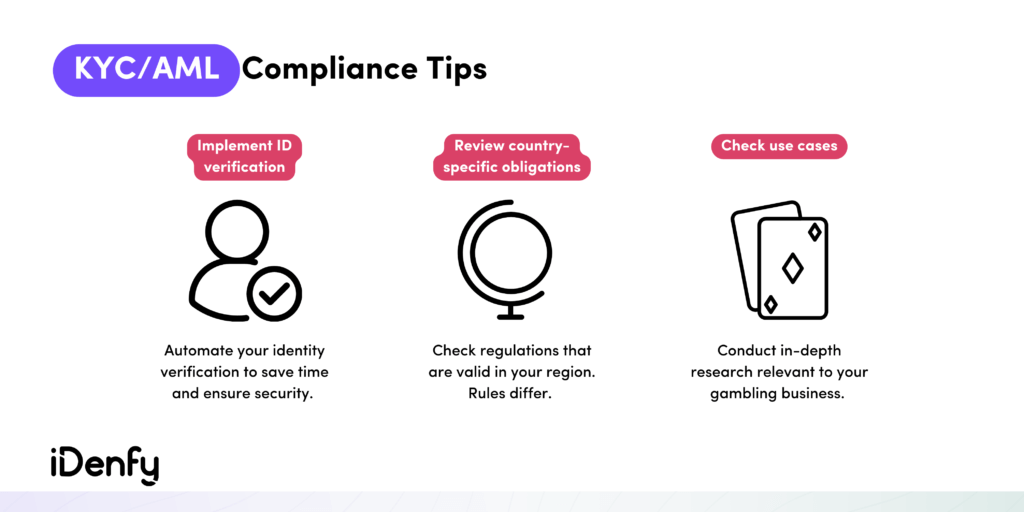
Online Gambling Fraud
Online gambling attracts many fraudsters and organized crime gangs. There’s no surprise here. As more consumers shift their gambling habits to the digital sphere, the fraud problem intensifies. Stolen identities and fake IDs aren’t the only fraudulent tools that criminals use to spin off money.
Be careful and watch out for the various types of fraud in online gambling:
Multiple Account Fraud
Criminals look for new ways to use dozens of different accounts and convert their schemes into cash. Many successful fraud stories in online gambling also depend on this tactic. As a result, fraudsters build other gambling attacks, including the ones mentioned below.
Bonus abuse: This happens when a user signs up to an online gambling platform multiple times to benefit from discounts targeted at new players. Criminals often use synthetic identities or personal information from the dark web. Promos are a great way to attract new users but can result in losses for the business.
Gnoming: This technique is often used in poker. The player creates multiple accounts of friends or even non-existent people to help one player win. That means the other accounts are decoys, used to lose the games so that one player could gather the prizes.
How to stop it: Robust fraud prevention tools, such as identity verification, authenticate users’ identities and detect fraudulent attempts to access online gambling platforms. Ongoing monitoring tools help spot suspicious patterns, alerting operators about gambling abuse in real-time. Other AI-powered services, including proxy detection, scan and review user IP addresses to prevent multiple account fraud.
How Does Fraud Impact Online Gambling Platforms?
There are multiple risk factors for fraud. Gambling scams can grow into serious AML compliance issues. Recently, the Gambling Commission fined Betfred, a famous bookmaker, for nearly £2.9m for failing to ensure customers’ safety with anti-fraud measures. One customer wasn’t stopped from losing £70,000 in just 10 hours.
That’s not all. With non-compliance consequences comes a lousy reputation. Business partners and investors are more likely to be skeptical when putting their money into unreliable organizations. Online gambling businesses that are known for high fraud levels are also more likely to lose customers.
Recommendations for Safer Online Gambling
There are safety principles for online gambling. According to the European Commission Recommendation, socially responsible gambling and digital anti-fraud measures make up a robust fraud prevention strategy.
Operators can take a more ethical approach by following these protocols:
- Financial limitations. Players can be allowed to set financial limits and restrict their gambling activities.
- Time-outs. Online gambling users can be granted permission to have temporary breaks.
- Playing patterns. Platforms can inform users if they play too much to prevent any potential gambling addiction issues.
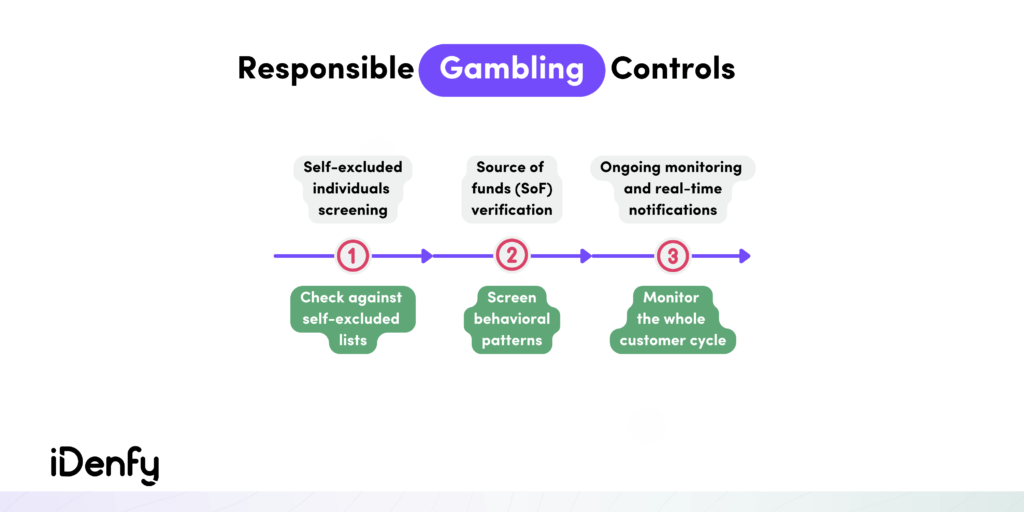
The Future of Identity Verification in Online Gambling
It’s not arguable that security measures, including identity verification, are important for the online gambling industry. Traditional casino operators are losing customers due to complex, time-consuming authentication processes.
In the meantime, digital identity verification solutions improve the players’ confidence in gambling services without them having to wait for their identity approval for hours or even weeks. It’s now an industry standard to automate this process. All it takes is a few steps for the player: to upload a photo of their identity document and add a selfie during the onboarding to confirm whether they’re legitimate.
Considering the risks in gambling, digital ID verification measures solve two main issues. That means online gambling platforms can now offer great customer service along with complete security and easier compliance insurance.
iDenfy: KYC/AML Compliance, IDV Tools, and More
Looking for AI-powered identity verification, compliance, and fraud prevention solutions? You’ve come to the right place! iDenfy’s platform has all the mentioned tools in one place.
Check what our gambling partners and other businesses have to say about our solutions, and book a free demo today.
This blog post was updated on the 30th of January, 2024, to reflect the latest insights.
